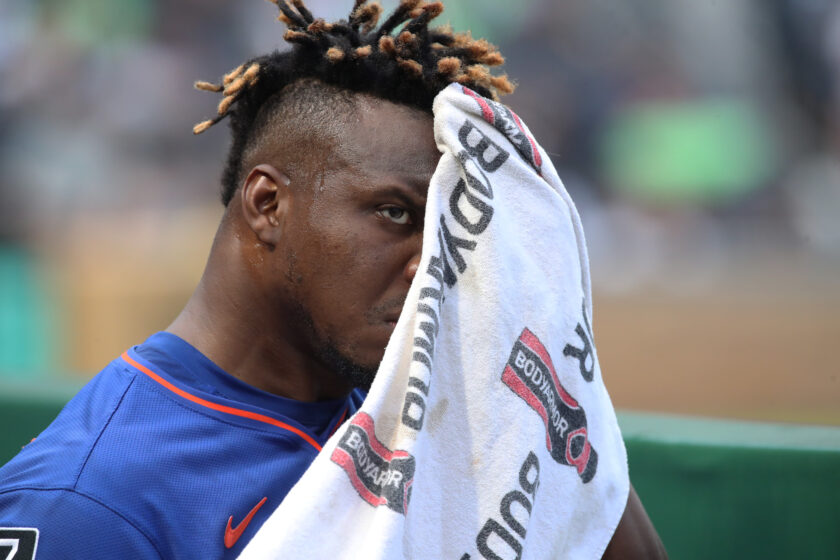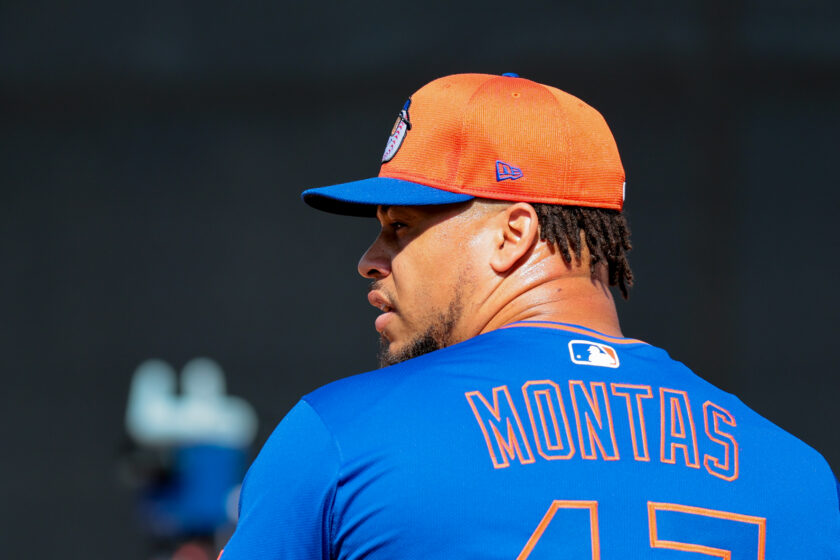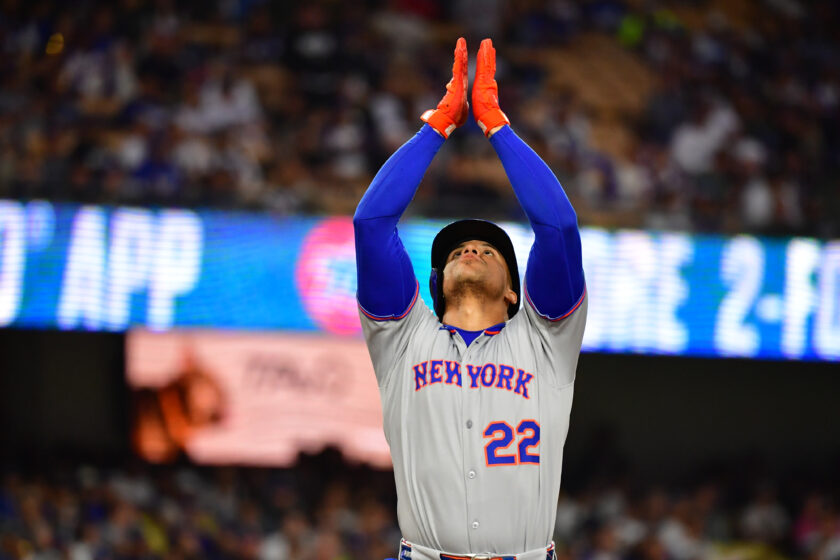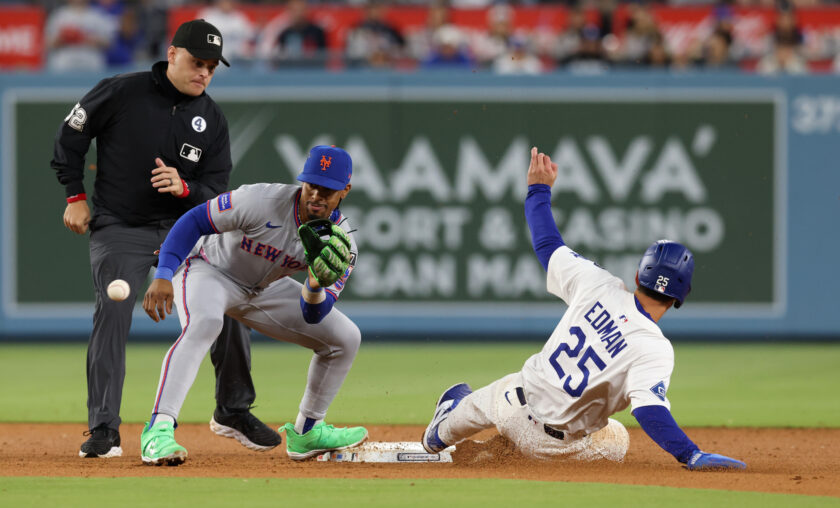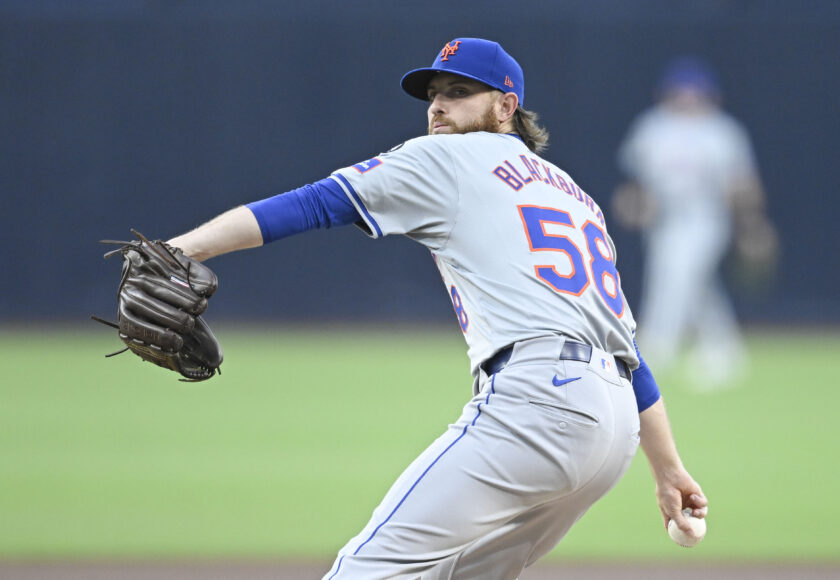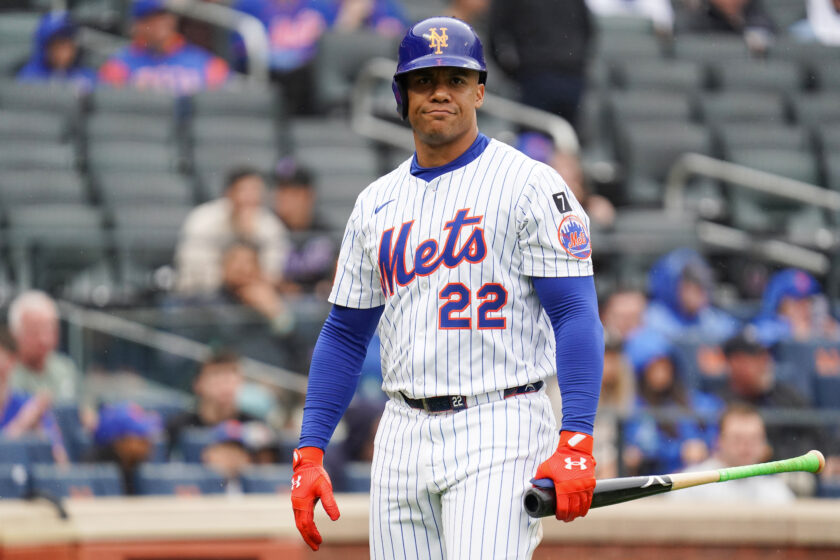ESNY Exclusive Interview: New York Mets top prospect Matt Allan
New York Mets top prospect Matt Allan took the time to talk to ESNY about his game, the draft, and how he’s been dealing with COVID-19.
[sc name=”kyle-newman-banner” ]The New York Mets shocked the baseball world when they selected Matt Allan in the third round of the 2019 MLB Draft. The media long believed that if he slid out of the first round, he would be nearly impossible to sign. That didn’t turn out to be the case.
Allan wound up signing with the Mets and earning a $2.5 million signing bonus. He then took the minors by storm dominating the Gulf Coast League before helping the Brooklyn Cyclones win their first New York-Penn League Championship.
Now Allan is widely considered the team’s top pitching prospect and is in nearly every publication’s top-110 prospects. The Mets and their fans have sky-high expectations for the 19-year-old pitcher from Florida.
I had the chance to speak with Matt Allan over the weekend about who he is as a player and what sets him apart from the rest of the pack.
Kyle Newman: When you were growing up who were your favorite players to watch?
Matt Allan: So truth be told, I wasn’t a big pitcher up until late freshman year, sophomore year. That’s when I really started taking pitching seriously. I was a hitter before, I played third base. I didn’t watch too many hitters, to be honest. I think honestly I preferred watching pitching, but I wasn’t much of a pitcher. I was a catcher or third base, kind of a big power guy.
Once I started pitching, I started getting better at it. Naturally, I just threw hard. Probably around sophomore year is when I started taking pitching really serious, and understanding that pitching is not just going out on the mound, stepping on the rubber, and just pitching. There’s so much more that goes along to scouting reports, taking care of your body, taking care of your arm, the body mechanics of pitching, and analytics.
I was pretty fortunate that my pitching coach at the time, Rob Marcello, he was awesome. He introduced me to utilizing your body and getting the most of your body. When I started doing that I started watching pitchers who I felt got the most out of their body.
My favorite one at the moment is Gerrit Cole. I watch his video all the time. Same with (Jacob) deGrom, same with (Max) Scherzer, guys like that I love watching their video, and I love, not necessarily trying to compare myself to them, but seeing what are things they do well that I also do well.
One of them is the vertical break on fastballs. They get a good amount of ride, all of them, and I try to compare that to myself and feed off of their game.
Newman: You talked a little about how analytics became one of thing that you looked to when you started looking at pitching more. Do you think those advanced analytics that are coming into the game today are going to be a big part of your development and your game as you stride towards the majors?
Allan: I think so for sure. The number one thing I pay attention to, that I pride myself on is competitiveness. At the end of the day, you have to get the hitter out. I know you could know some extra analytical stuff, but at the end of the day, competition is competition.
I definitely feel that the Mets have helped me understand my analytical data so well. I took that from the GCL season to Brooklyn and into the offseason. I looked at the data and said okay what did I well in high school, what helped me succeed in the GCL and in Brooklyn, and how can I apply that to getting better this offseason.
So, things that I wanted to work on was increasing my vertical break on my fastball and my curveball becoming more consistent with better vertical break. Those were two big things that I learned once I got to the GCL and had so much more time on my hands. When I was in high school I still hit, I still practiced first base, so I didn’t practice as much. Once you get to a higher level though, you have to increase your awareness about how you’re spending your time.
So, my time learning and understanding pitching increased when I got to the GCL. I know I applied analytics when I was in Brooklyn and guys helped me understand scouting reports and hot zones for different hitters. What does this swing pattern mean when I face a guy? For sure, I think analytics are awesome and they’re going to help me progress.
Newman: What do you think makes you special on the mound? Is it the raw stuff? Is it your competitive mentality? Is it because you put in more work off the field? What do you think separates you from the rest of the pack when you take the mound?
Allan: I think for me, it’s honestly my desire to win, my desire to be great, the hunger, the competitiveness that I have on the mound. Not necessarily to prove something, but to let the hitter know, let the other team know that I’m going to get you out, I’m throwing my best stuff at you and take your best shot at hitting it.
I’m that confident in my stuff, not arrogant, but just so confident in my ability and all the work I put on off the field. All the hours that nobody watching. Working on holds, working on picks, mentally going through situations. Everything I do off the field helps me build the confidence and competitiveness that I need when I step on the rubber.
I know I did everything I could in-between starts, that bullpen, that extra catch-play, that extra workout I did. It lets me know that I took every day seriously in getting the work done that I need to do preparing for my next outing.
I think that’s what will continue to help me separate myself. For me, it’s the mental side. Once you get into pro ball everybody’s got a good fastball, good offspeed, they all have good stuff. So what separates you from them? For me, I think it’s the raw talent paired with my work off the field and pure hunger to get the guy out.
Newman: Can you tell me what it was like to go through the pre-draft process and what it was like to go through the MLB Draft? You were the number one high school pitcher on most boards last year and saw yourself slip down to the third round where the Mets take you. Can you talk about how that felt, to go from the pre-draft process where everyone’s talking you up only to see yourself fall a bit?
Allan: My goal last year, for the high school season, was to win a state championship. My school (Seminole HS) generally doesn’t get a whole lot of respect. We always seem to have pretty good talent and then we would lose early on in the playoffs.
We had a new coach, Kenne Brown, who was awesome. He did such a good job of keeping me on track. He didn’t let the pressure of the scouts or the pressure of the game get in the way of my initial goal and the team’s goal. We all wanted to win the state championship for each other.
I was really fortunate and blessed that throughout the whole process my initial desire my driving force. As the hype began to build I was able to focus on winning a state championship for my team. We ended up winning the state championship.
The draft was a couple of days later. Obviously, being a teenager with social media I knew where I was in the online rankings. The Boras Corp. really did an amazing job of letting me know that crazy things happen on draft day and there’s going to be things that won’t go your way that you have no control over. They did an amazing job of preparing me for the draft and anything that could happen.
I truly understood that a lot of things were going to be out of my control. Ultimately my goal for the draft was the get drafted, which happened. I’m so fortunate that the Mets picked me and trusted me with their third selection.
I was really happy, I was with my family at the time. It was definitely a different feeling at first, but the initial goal was to get drafted. Ultimately, I got drafted and I’m so happy because of it.
Newman: One of the reasons that you fell was signability concerns. There was a lot of talk that you had a really strong commitment to Florida, and that was one fo the reasons that teams were afraid to pick you. They didn’t know if they were going to be able to sign you. What about the Mets made you decide to head to professional baseball instead of heading to Florida who’ve put out elite pitches like Brady Singer and Alex Faedo in recent years?
Allan: Education is huge in my family. I became the first person in my family to not go to college, so that decision was really hard. I had a good relationship with the area scout, Jon Updike, with the Mets. I think he knew that I wanted to start my pro career.
I felt that I was ready. I was fortunate enough that I was surrounded by some excellent people, from Kenne Brown, David Eckstein, the Boras Corp., and all these really fantastic players I played with over the summer. I felt like I was up for the challenge and I was ready. So, when the Mets called I was super happy.
It definitely took some time to decide, but I felt 100% that I was ready to start my pro career. I wanted to go.
Newman: You proved that you were ready last year. You came out firing in the GCL and then you were sent up to Brooklyn. At 18-years-old in your first professional season, you’re pitching in the deciding game of the New York-Penn League championship in a tie game. You come out and throw three shutout innings. What was that like?
Allan: It was awesome for sure. The GCL was a really good step for me personally. Being a rookie, that taught me a lot about the routine that you have to be in.
Going from a seven-day rotation in high school to a five or a six-day rotation in the GCL and just getting in a routine, getting out on the field every day, PFPs (pitcher fielding practice), picks. Doing the little things that pitchers my age usually don’t feel like is a big deal because your probably striking guys out and they’re not getting on base, your not to worried about it. When your in the GCL and your facing real competition it definitely plays a big part.
I had some success in the GCL and when I was sent up to Brooklyn I was super happy. It was around the time the hurricane was coming in. I got a call and they said “Hey tomorrow morning you’re going up to Brooklyn.” I was super excited. I called my family and told them I was really happy and that they’d need to pick up my car from the GCL because I didn’t want it to sit there.
Just being in Brooklyn it was a whole different atmosphere. In the GCL there aren’t a whole lot of fans it’s basically just your teammates and it’s obviously really hot in Florida. So when I got up there it was breezy, 65 degrees, we played nighttime games and the competition was better.
I felt like after my first outing that I built the confidence that I needed to prove that I deserve to be here. I let myself know that I belong here and don’t feel that you’re too young or anything like that. So, when I pitched in the championship I was as confident as ever.
Going into that game I watched Garrison Bryant, who I had a really good relationship with, throw two games before. He absolutely shoved, so I asked him a lot of questions about how he approached the hitters. The catcher, Jake Ortega, and I had some great conversations in the dugout before and during the game. For me, all three pitches were working that day, so that helps.
It was just awesome. With the crowd and it being in Brooklyn, New York, it was just awesome.
Newman: You mentioned Garrison Bryant and Jake Ortega, were there any other teammates or coaches that you connected with and really helped you through your early development after the Draft?
Allan: Being in the same draft class as Brett Baty and Josh Wolf, we hung together for the most part. When Brett got called up to Kingsport is was mainly just Josh and I. I also had a really good relationship with a later pick in the draft, Jace Beck. I had a really good relationship with both of them and we seemed to do just about everything together from off days, to catch-play, locker room talk, getting dinner, and stuff like that. I think that was really big for everybody. All three of us built that relationship so quickly.
When I got sent up to Brooklyn I naturally gravitated towards Garrison. I think he was leading the team in ERA and wins, so I wanted to learn how he was having that success. Matt Cleveland was another big one. Brett and I talked a lot because we were the two youngsters there, and so we had a lot of conversations in the locker room.
(Josue) Matos, the pitching coach, he was awesome. He was there helping me understand how the routine was going to go in Brooklyn. It was different in Brooklyn because in the GCL you have mid-day games and you’re there at seven o’clock in the morning. When you’re in Brooklyn and your playing night games you’re not there until two or three.
Everyone just did such a wonderful job of making me feel like I was at home.
Newman: How have you been coping with COVID-19? It’s shut down baseball as we know it right now. It doesn’t look like there’s going to be a minor league season this year. So, how have you been able to keep your development on track?
Allan: My family was very fortunate, we didn’t take as big of a hit from COVID as other families. My dad’s a real estate agent, so he was able to keep trucking along. My mom is a nurse and she got called up the COVID unit a couple of time, my sister is a nurse as well. So, my family is pretty fortunate that our lives just kept going. I think it was me just being home that was the real outlier.
On the development side of things, I had a place where I could work out until it got shut down. I have a mini weight room in my garage with a squat rack, a bar, and a bunch of different weights. So, I took upon myself to just keep going.
I didn’t have a big facility or anything but I had my garage gym, which was good enough. I also had a portable mound from my facility, but I wasn’t throwing any pens at the time. Towards the back half of COVID quarantine, I started throwing pens, so I just asked one of the local high school catchers to come and I’d kind of just throw it in my driveway. From a development standpoint, my big goal was to keep going. Don’t let this give you a reason to stop.
Talking to other guys like Jace Beck, Brett Baty, and Josh Wolf they all kept going as well. They kept up the facility type stuff if they could, and the Mets sent us a bunch of bodyweight exercises that we could do. They did a lot of Instagram posting about nutrition, strength, and recovery.
The Mets just did such a good of giving us, as players, such practical things to do. So, if you didn’t have a squat rack you could do some bodyweight exercises. I tried to keep in communications with a lot of the guys just to see how they were doing or if they needed anything.
Recently, my facility opened back up, and throwing has picked up more. I started throwing heavier pens, live batting practice, things like that.
I’ve been in constant communication with the Mets and trainers. They’ve done such a good job of checking in and making sure all areas are covered.
For me, I think it’s a little bit of a blessing in disguise. I kind of get a second offseason to get the information that I use from spring training to apply myself. It’s helped me to figure out what I need to do if we go back or if there isn’t another spring training. It allowed me to cover all the bases that I may have missed this past offseason.
One example is my nutrition and recovery. This allowed me to improve those little off the field details that make such a big difference on the field.
I’m just eager to go back and I’m ready for whenever the call comes.
A contributor here at elitesportsny.com. I'm a former graduate student at Loyola University Chicago here I earned my MA in History. I'm an avid Mets, Jets, Knicks, and Rangers fan. I am also a prodigious prospect nerd and do in-depth statistical analysis.

